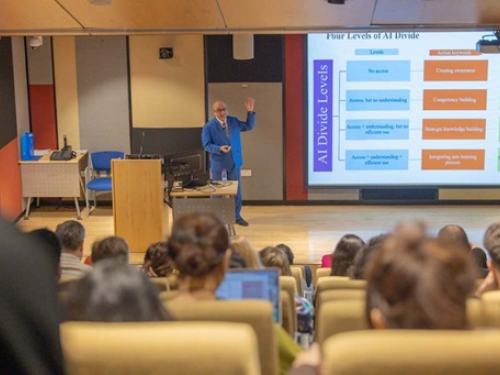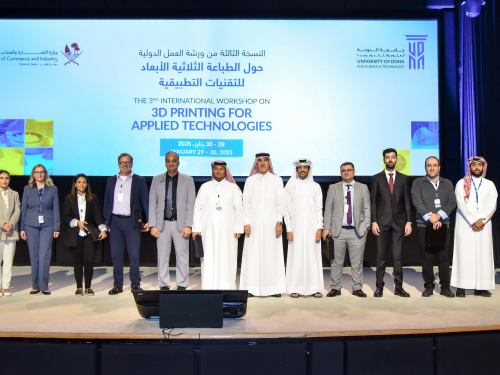
The Center of Excellence for Food Security and Sustainability at University of Doha for Science and Technology (UDST) in partnership with the Ministry of Environment and Climate Change and the Ministry of Municipality and a number of local and international partners, proudly hosted the International Conference on Water and Food Security in the Face of Climate Change: Challenges and Opportunities for Resilience (WFCC 2025). This global event was attended by H.E. Dr. Abdullah bin Abdulaziz bin Turki Al Subaie, Minister of Environment and Climate Change (MECC), Dr. Salem Al-Naemi, President of University of Doha for Science and Technology and high-level delegates, and brought together researchers and industry leaders to discuss innovative solutions for water and food security challenges posed by climate change aligned with the United Nations Sustainable Development Goals (UN-SDGs), including SDG2, Zero Hunger, SDG 6 Clean Water and Sanitation, and SDG 13 Climate Action.
The conference featured keynote speeches from Hamad Hadi Al-Hajri Assistant Director of Food Security Department at the Ministry of Municipality; Prof. Walter Leal Filho, Hamburg University of Applied Sciences, Germany; Prof. Jeffrey J. McDonnell, Global Institute for Water Security and Prof. Ronald Corstanje, Cranfield University, as well as high-level panel discussions with distinguished panelists, including the Ministry of Environment and Climate Change, and hands-on technical upskilling workshops addressing critical topics such as the impact of climate change on water resources, innovations in sustainable agricultural technologies, and strategies for achieving global food security.
During the conference, The World Food Forum (WFF) Qatar National Youth Chapter was officially established for the first time in the Middle East, marking a significant milestone in youth-led sustainability efforts. Spearheaded by Youth Chair Mr. Abdulrahman Al Kuwari, a fourth-year Chemical Engineering student at UDST, this initiative is a collaborative effort between the Ministry of Municipality, the Food and Agriculture Organization of the United Nations (FAO), and advisors from the University of Doha for Science and Technology (UDST). The WFF Qatar National Youth Chapter is a pioneering platform dedicated to empowering young leaders to champion sustainable agrifood systems. This initiative aligns with FAO’s mission to engage and inspire youth in driving innovative solutions that support UN-SDGs, particularly in the areas of food security, climate resilience, and community-driven sustainability efforts.
The International Conference on Water and Food Security in the Face of Climate Change: Challenges and Opportunities for Resilience, in which the Ministry is a strategic partner, is an important forum for bringing together experts, researchers, and decision-makers from around the globe to discuss the increasing challenges posed by climate change on water and food security, according to H.E. Dr. Abdullah bin Abdulaziz bin Turki Al Subaie, Minister of Environment and Climate Change (MECC).
His Excellency highlighted that the Ministry’s participation in this conference as a strategic partner underscores Qatar's commitment to achieving sustainable development and enhancing its response to climate change, in line with Qatar’s vision of environmental protection and sustainability.
Furthermore, His Excellency emphasized the MECC’s strong commitment to the “National Adaptation Plan”, a comprehensive roadmap designed to address climate change challenges. The plan prioritizes strengthening the resilience of key sectors, particularly water and agriculture, through the implementation of effective strategies. These include optimizing water resource management, promoting sustainable agricultural practices, and safeguarding coastal ecosystems.
Dr. Salem Al-Naemi, President of University of Doha for Science and Technology, commented: "Hosting this conference reflects our dedication to advancing research and innovation that aligns with Qatar’s Third National Development Strategy and the UN Sustainable Development Goals. By bringing together experts, decision-makers, and students from around the world, we confirm Qatar’s position as a global leader in using education and research to address critical water and food security and climate change challenges. This conference also highlights the role of UDST in shaping responsible global citizens. As an applied university, we are dedicated to equipping our students with the knowledge and skills to tackle pressing global issues, inspiring them and our faculty to actively contribute to creating innovative solutions that drive sustainable progress for future generations."
Kazuki Kitaoka, Director, Office of Youth and Women, Food and Agriculture Organization of the United Nations (FAO) said: “It is excellent to see that the International Conference on Water and Food Security in the Face of Climate Change engages and empowers young leaders by fostering innovation and prioritizing science education. I believe that equipping youth with the necessary tools to tackle the pressing challenges of our agrifood systems is truly imperative for building a better food future, ensuring good food for all, for today and tomorrow. The WFF Qatar Chapter will, no doubt, further strengthen this mission, fostering local action and global impact with the brilliant minds of Qatari youth.”
One of the conference's key highlights was the Arab Youth Competition, which received 106 submissions and showcased youth-led innovation projects tackling Food and Water Security, bringing together passionate young changemakers from Arab Countries. The competition brought together participants from Saudi Arabia, Palestine, Oman, Algeria, Lebanon, Qatar, Egypt, and UAE, who presented topics about climate change impacts, food security, and water resource management.
The winners of the Undergraduate category were Haseeb Tariq and Adil Abdulhameed from Qatar University for their project Fabrication of 2D-Printed Thin Film Composite Forward Osmosis (FO) Membrane for Applications in Sustainable Agricultural Fertigation.
In second place came Mo Hamed Kurdi and Sameh Nasif Mukhtar Abdelgadir from University of Doha for Science and Technology for their project Climate-Proof Crops: Boosting Food Security with Biochar-Bokashi Blends.
In third place came Maiyar Ahmed Salim Aljahwaria and Balqees Nasser Hamood Alkhayali from University of Technology and Applied Science, Oman.
The winners of the Post-Graduate category was Mefaredj Sara from University of Constantine 03- Salah Boubnider – Algeria for the project Optimizing Azolla and Water Lentils Cultivation in Automated Raceway Ponds for Affordable, Nutrient-Rich Livestock Feed in Algeria. (AZOLERIA).
In second place came Layan Helmi and Mayyas Mohamad Othman from Beirut Arab University for their project Removal of Contaminants from Water Using Tomato Leaves as Adsorbent.
In third place came Zukhruf Asim and Zainab Elkahlout from Qatar University for their project Effect of Operational Parameters of High-Value Single Cell Protein Production from Vegetable Waste.
The conference workshops offered participants hands-on training in topics such as connected farming using IoT for water management and machine learning approaches to food security. These sessions highlighted the role of technology and innovation in building sustainable solutions.
WFCC 2025 showcased the UDST Center of Excellence for Food Security and Sustainability’s role as a leading hub for technological research and innovation in Sustainability. Spanning over 10,000 sqm, the Center features cutting-edge laboratories, research greenhouses, hydroponic systems, and smart irrigation solutions, promoting sustainable agriculture by optimizing vegetable and date palm cultivation, developing water-efficient greenhouse systems, preserving soil health, and safeguarding date farms. The Center also leverages artificial intelligence (AI) and the Internet of Things (IoT) to enhance livestock management for sustainable milk and meat production, while creating adaptive tools to monitor and manage Qatar’s groundwater resources under the impacts of climate change.



